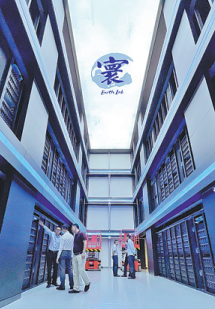By HAO NAN | China Daily
As a national scientific and technological innovation center, Beijing has made countless efforts to implement an innovation-driven development strategy in the past decade, local officials said.
Beijing Mayor Chen Jining said the city's biggest advantages lie partly in its human resources and sci-tech industries.
"We have taken enhancing China's strategic sci-tech strength as an important responsibility, and provided it with all-around support," Chen said.
Beijing has built three national laboratories in the Zhongguancun area and the districts of Changping and Huairou, centering on information, life and energy sectors. Since being put into use, they have witnessed important achievements.
Xiaoliang Sunney Xie and his team at the Changping lab, for example, have discovered a mechanism in COVID-19 that explains how it can evade people's immune systems.
The city also accelerated the construction of the Beijing Huairou National Science Center. Its most prominent feature is providing a high-quality public service platform for basic research and original innovation via a cluster of large-scale science installations.
One of them is the EarthLab, China's first Earth system numerical simulation facility. It was launched in the science center in June 2021.
As the "digital twin" of planet Earth, the facility can simulate climate, environmental, ecological and space weather systems, and predict and mitigate natural disasters.
The science center's comprehensive extreme condition experimental device — built by the Institute of Physics at the Chinese Academy of Sciences — has been open to domestic and foreign users. Extreme conditions such as subzero temperatures and strong magnetic fields are helping scientists observe colorful quantum phenomena in the mesoscopic system and microworld.
Moreover, five interdisciplinary research platforms have been put into trial operation and another 22 technological facilities are under construction.
To encourage local universities and research institutes in the commercialization of sci-tech achievements, Beijing has cooperated to establish 24 cutting-edge innovation centers, 78 national engineering research centers, four national technological innovation centers and eight world-class new-type research and development institutions.
These have promoted the close combination of sci-tech and industries, Chen said. In the past 10 years, the number of annual international patent applications filed via the Patent Cooperation Treaty in the city has increased from 2,705 to 10,358.
To attract more talented workers, Beijing has created more development space for talents of all kinds by optimizing support policies and detailing evaluation standards. The city also launched policies to attract top-notch talents and built eight international communities to offer a convenient living and learning environment for them.
In 2020, Beijing brought in a special regulation to boost the commercialization of sci-tech achievements. It says the intellectual property rights of sci-tech achievements made in the workplace can be owned by individuals, which allows innovators to receive related benefits.
The city has also carried out a pilot project of IP insurance in Zhongguancun since 2020 and established a risk-sharing mechanism for IP pledge financing.
In 2021, Beijing's turnover from technological contracts exceeded 700 billion yuan ($99.82 billion).
Over the past decade, Beijing has made historic achievements in sci-tech innovation.
Official statistics show that from 2012-21, the city's investment in research and development grew from 106.34 billion yuan to 262.93 billion yuan; the number of State-level high-tech businesses rose from 3,300 to 27,600.

The EarthLab, China's first Earth system numerical simulation facility, is launched in Beijing in June 2021. HOU SHAOQING/FOR CHINA DAILY